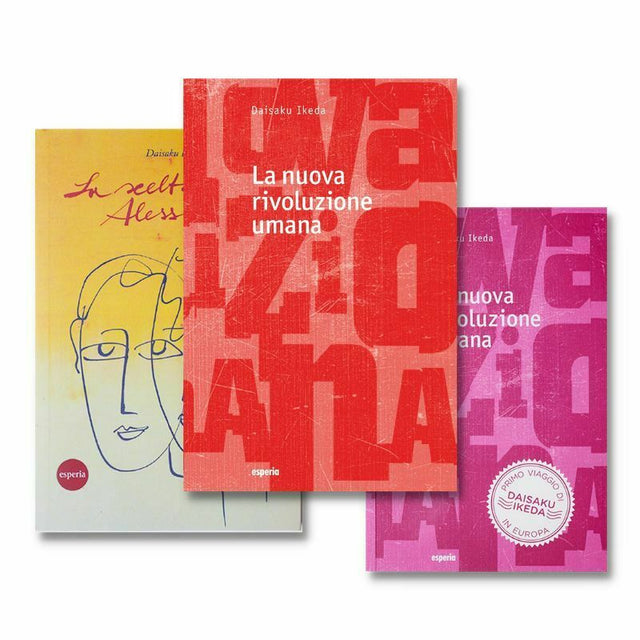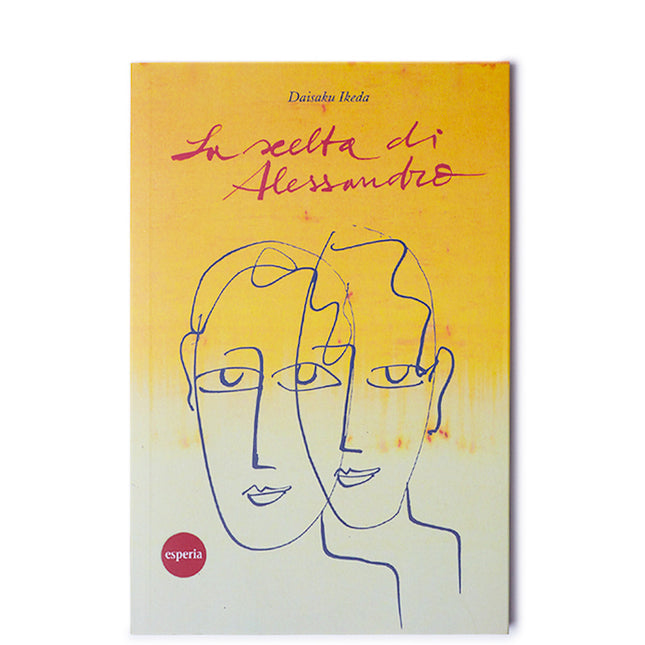
Novels
-

Esperia The new human revolution vol. 27
The year 1978, which was designated as the "Year of Study" and whose events are described in this volume, saw Shin'ichi Yamamoto engaged in a series of trips to various prefectures and regions of Japan. In meeting with members and leaders, Shin'ichi takes every opportunity to extend warm encouragement and guidance to them, in which he lavishes his whole being, never sparing himself. During meetings, sometimes even informal ones, Shin'ichi reiterates the fundamental principles that underlie the Soka Gakkai, such as the importance of personal encouragement and the meaning and function of discussion meetings. He also pledges to visit the pioneers in those areas, whose homes for years have served as the base of operations for local activities, to thank them personally.In addition, on April 9, 1978, the Tokyo Soka Elementary School is inaugurated.Shin'ichi Yamamoto thus sees the goal, so dear to his teacher Toda and the first Soka Gakkai president Tsunesaburo Makiguchi, of completing an entire Soka school system, from kindergarten to postgraduate studies, based on Makiguchi's educational ideals, realized. For Shin'ichi, it is also the realization of his commitment to raising capable individuals, based on the belief that young people are the leaders of the future.
€20,00
-

Esperia The New Human Revolution vols. 13/14
The autobiographical novel of Daisaku Ikeda, president of SGI. The years 1968 and 1969, the events of which are recounted in these two volumes, are decisive for the development of the Soka Gakkai, for they saw its president Shin'ichi Yamamoto take on a very delicate and important task. At the invitation of certain Chinese government officials, Shin'ichi takes it upon himself to initiate the process that over the course of several years will lead to the reopening of diplomatic relations between China and Japan. The initiative naturally causes many repercussions, as the Soka Gakkai president's action affects foreign policy issues with respect to which the Japanese government has taken a very cautious stance. But Shin'ichi Yamamoto is certain that the peoples of the two nations desire peace and mutual friendship above all else, and he is ready to face any difficulty to see his great goal realized. "My friends, look with an open face at the endless chain of calamities and miseries that afflict the world! Do not look away from the vortex of suffering that constitutes reality! We must speak boldly and constantly for the happiness and peace of humanity. We must offer the world wise and insightful words. And we must act. To live is to struggle. This is the mission and the great path of Buddhist practitioners."
€20,00
-

Esperia The New Human Revolution vols. 9/10
The autobiographical novel of Daisaku Ikeda, president of SGI. 1964 and 1965 are busy years for Shin'ichi Yamamoto. The young Soka Gakkai president begins writing the novel The Human Revolution with the aim of conveying the spirit of his master Josei Toda. He also pours all his energy into raising "young phoenixes" and developing the Seikyo Shimbun, which becomes a daily newspaper in 1965. He continued his travels throughout Japan and the rest of the world to encourage members and pioneers of the kosen rufu movement: the United States, France, Germany, Italy, Portugal and, for the first time, Mexico, a country that, shortly before his death, Toda had dreamed of visiting. Inspired by his actions, many young Japanese moved abroad to boost propagation and challenge their personal destinies: kosen rufu was taking on the profile of a movement that spanned the globe.
€20,00
-

Esperia The Hiroshima Notebook
A novel by Daisaku Ikeda set in Hiroshima. "An indomitable spirit, capable of enduring any adversity." This phrase kept echoing in the mind. Life is full of unhappiness and pain. When we know a setback, it may happen that we are overwhelmed by despair. But that suffering is the material with which we build our existence. One can blame fate and resign oneself to defeat, or one can resume life aiming for happiness -- it all depends on whether or not one has "an indomitable spirit, capable of enduring any adversity."
€9,90
-

Esperia editions The Eternal City
The novel opens with the 1900 Jubilee in Rome, at the height of the diatribe between the Vatican and the Italian state over the temporal power of the Church. Against this backdrop are the social claims of the time, animated by a Christian socialism with which Caine himself was imbued. Davide Rossi is a Leftist deputy who fights for the people and opposes a corrupt prime minister, who will try to prevent the crowning romance between Rossi and Donna Roma Volonna. Caine lingered in Rome for a long time, visiting every place depicted in the novel; the descriptions of Regina Coeli, the Vatican and its ceremonies, the city's fashionable places and its squares teeming with ordinary people restore the climate of the time. The book is imbued with a religious sense of life, and the characters, even the most abject, are described compassionately, as a true investigator of the human soul. Reading this text more than a century after its release one cannot but be struck by the author's visionary ability: he foresaw for Italy, albeit in terms of "fantapolitics," the dictatorship, the abdication of the monarchy and the birth of the Republic, forty years in advance. Thomas Henry Hall Caine (1853-1931) wrote some fifteen novels, true best-sellers, which earned him the title of "Sir" in 1917. The Isle of Sin (1894) is the best known of his works, thanks to A. Hitchcock's film adaptation in 1929. The Christian (1897) was the first book to sell one million copies in England. Pietro Mascagni set the stage version of The Eternal City to music in 1902.
€19,90
-

Esperia The New Human Revolution vols. 21/22
The autobiographical novel of Daisaku Ikeda, president of SGI. 1975 is the founding year of the International Soka Gakkai. On January 26, representatives from more than fifty countries around the world gather on the island of Guam to celebrate the start of a worldwide peace movement. President Yamamoto is fresh from a trip to the United States during which he met with the U.N. secretary general and the U.S. secretary of state. It is the latest step in a series of initiatives he has taken to foster dialogue and détente among the world's great powers. The First World Peace Conference is an opportunity for Shin'ichi to reconfirm before all the assembled representatives the goal he was entrusted with by his mentor Josei Toda: "Mr. Toda, I will devote my whole life to realizing kosen rufu in the world in order to bring happiness and peace to all mankind." The Soka Gakkai president's people's diplomacy initiatives continue, and in April he leaves for a third trip to China, to be followed by another trip to the Soviet Union and Europe. The Soka Gakkai meanwhile continues to expand the scope of its activities. In July the city of Honolulu in the Hawai'i Islands hosts a major cultural festival that marks another new step in the kosen rufu movement around the world.
€20,00
-

Esperia The New Human Revolution vols. 7/8
The autobiographical novel of Daisaku Ikeda, president of SGI. Volumes VII and VIII cover the chronicle of 1962 and 1963, years of great development both in Japan and abroad for the Soka Gakkai. While this sprouts seeds of hope in many countries, in South Korea the spread of Nichiren Buddhism triggers severe persecution of Gakkai members. In 1962, the Bay of Pigs crisis exposed the fragile balance of the Cold War, and only Kennedy's nerves averted the nightmare of an atomic war. The American president wishes to meet with Shin'Äôichi Yamamoto, but this meeting, equally desired by the president of the Soka Gakkai, will be canceled due to interference by some Japanese politicians. In 1963 Kennedy is assassinated in Dallas. The event shocks the whole world and leaves President Yamamoto's heart with the regret of not having been able to dialogue with him; he nevertheless makes his own determination to carry forward the humanitarian ideals so dear to President Kennedy.
€20,00
-

Esperia Alexander's choice
A novel by Daisaku Ikeda on the theme of friendship.333 BC. Alexander the Great, aiming to conquer the East, contracts a serious illness. None among the wise men in his retinue can find a cure that can snatch him from death. But in the nocturnal quiet of the camp, as the disease slowly consumes his body, a tormenting doubt tears at his soul. Is the potion prepared for him by Philip, the faithful childhood friend and personal physician, a medicine or a poison? Quick as the wind, sent by one of his generals, a messenger on horseback arrives to deliver to him the letter on which the answer is inscribed: Philip is a traitor. The young and invincible king will then find himself wondering whether to heed the messenger and disown his lifelong friend, or to bring the cup to his lips and risk his life. The classical world meets Buddhist teaching and offers Master Ikeda an opportunity to celebrate, in a compelling and valuable book, the value of loyalty and friendship. True friendship is not based on calculation. Gold and wealth cannot buy it. It makes us better: it brings out our qualities, helps us make each other happy and, as we strive to do so, gives us joy. Therefore, the friend is like a second self; in friendship two people become one, and such a bond we can call it life.
€9,00
You have seen 20 out of 20 products









